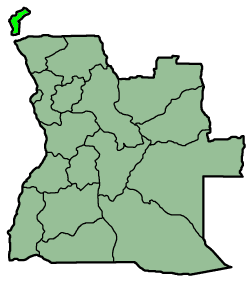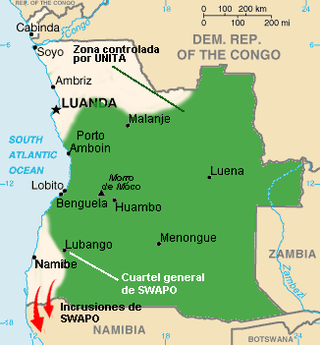
United Nations Security Council resolution 733, adopted unanimously on 23 January 1992, after expressing its alarm at the situation in Somalia regarding the heavy loss of life, destruction to property and threat to regional stability, the council, acting under Chapter VII of the United Nations Charter, decided to place a "general and complete" arms embargo on the country for the purposes of establishing peace and stability. The situation was brought to the attention of the security council by the Somali government.

United Nations Security Council resolution 811, adopted unanimously on 12 March 1993, after reaffirming resolutions 696 (1991), 747 (1992), 785 (1992), 793 (1992) and 804 (1993), the Council expressed its concern at recent fighting and condemned the violations of the "Acordos de Paz" peace agreement in Angola by UNITA, including its rejection of election results and negotiations in addition to its resumption of hostilities.

United Nations Security Council resolution 834, adopted unanimously on 1 June 1993, after reaffirming resolutions 696 (1991), 747 (1992), 785 (1992), 793 (1992), 804 (1993), 811 (1993) and 823 (1993), the council indicated its concern at the deteriorating political, military and humanitarian situation in Angola and extended the mandate of the United Nations Angola Verification Mission II for a period of 45 days ending 15 July 1993.

United Nations Security Council resolution 851, adopted unanimously on 15 July 1993, after reaffirming resolutions 696 (1991), 747 (1992), 785 (1992), 793 (1992), 804 (1993), 811 (1993), 823 (1993) and 834 (1993), the Council noted the continuing deterioration of the situation in Angola and extended the mandate of the United Nations Angola Verification Mission II until 15 September 1993, discussing further the peace process in the country.

United Nations Security Council resolution 864, adopted unanimously on 15 September 1993, after reaffirming resolutions 696 (1991), 747 (1992), 785 (1992), 793 (1992), 804 (1993), 811 (1993), 823 (1993), 834 (1993) and 851 (1993), the Council noted the continuing situation in Angola and went on to condemn and place international sanctions on UNITA.

United Nations Security Council resolution 865, adopted unanimously on 22 September 1993, after reaffirming resolutions 733 (1992), 746 (1992), 751 (1992), 767 (1992), 775 (1992), 794 (1992), 814 (1993) and 837 (1993), the Council addressed the process of national reconciliation and political settlement in Somalia, during the civil war.

United Nations Security Council resolution 893, adopted unanimously on 6 January 1994, after reaffirming resolutions 812 (1993), 846 (1993), 872 (1993) and 891 (1993) on Rwanda, the Council noted that the situation in Rwanda could have implications for neighbouring Burundi and authorised the deployment of a second military battalion of the United Nations Assistance Mission for Rwanda (UNAMIR) to the demilitarised zone.

United Nations Security Council resolution 903, adopted unanimously on 16 March 1994, after reaffirming Resolution 696 (1991) and all subsequent resolutions on Angola, the Council strengthened and extended the mandate of the United Nations Angola Verification Mission II until 31 May 1994.

United Nations Security Council resolution 912, adopted unanimously on 21 April 1994, after reaffirming all resolutions on the situation in Rwanda, particularly resolutions 872 (1993) and 909 (1994), the council expressed its alarm and condemnation of the large-scale violence in the country which resulted in the death of thousands of innocent civilians, and proposed a revised mandate of the United Nations Assistance Mission for Rwanda (UNAMIR).
United Nations Security Council resolution 932, adopted unanimously on 30 June 1994, after reaffirming Resolution 696 (1991) and all subsequent resolutions on Angola, the council discussed the situation during the civil war and extended the mandate of the United Nations Angola Verification Mission II until 30 September 1994.
United Nations Security Council resolution 950, adopted unanimously on 21 October 1994, after reaffirming resolutions 813 (1993), 856 (1993), 866 (1993) and 911 (1994), the Council noted the deteriorating situation in Liberia and extended the mandate of the United Nations Observer Mission in Liberia (UNOMIL) until 13 January 1995.

United Nations Security Council resolution 993, adopted unanimously on 12 May 1995, after reaffirming all resolutions on Georgia, particularly 971 (1995), the Council discussed efforts for a political settlement between Georgia and Abkhazia and extended the mandate of the United Nations Observer Mission in Georgia (UNOMIG) until 12 January 1996.

United Nations Security Council resolution 1001, adopted unanimously on 30 June 1995, after reaffirming resolutions 813 (1993), 856 (1993), 866 (1993), 911 (1994), 950 (1994) and 972 (1995), and 985 (1995) on Liberia, the Council discussed the implementation of peace agreements in the country and extended the mandate of the United Nations Observer Mission in Liberia (UNOMIL) until 15 September 1995.

United Nations Security Council resolution 1040, adopted unanimously on 29 January 1996, after considering letters by the Secretary-General Boutros Boutros-Ghali and statements by the President of the Security Council, the Council addressed the civil war in Burundi and efforts for political dialogue.

United Nations Security Council resolution 1041, adopted unanimously on 29 January 1996, after recalling all resolutions on the situation in Liberia, particularly 1020 (1995), the Council extended the mandate of the United Nations Observer Mission in Liberia (UNOMIL) until 31 May 1996 and discussed efforts to restore stability in the country.

United Nations Security Council resolution 1049, adopted unanimously on 5 March 1996, after reaffirming Resolution 1040 (1996) concerning Burundi, the Council called for an end to violence in the country and discussed preparations for a conference on security in the African Great Lakes region.

United Nations Security Council resolution 1076, adopted unanimously on 22 October 1996, after considering the situation in Afghanistan, resolutions by the General Assembly and the Joint Declaration made on 4 October 1996 by the leaders of Kazakhstan, Kyrgyzstan, Russia, Tajikistan and Uzbekistan on developments in the country, the Council discussed the deteriorating political, military and humanitarian situation in Afghanistan.

United Nations Security Council resolution 1078, adopted unanimously on 9 November 1996, after expressing concern at the situation in the African Great Lakes region, the Council discussed proposals for a regional conference on security and a multinational humanitarian force in eastern Zaire.

United Nations Security Council resolution 1080, adopted unanimously on 15 November 1996, after reaffirming Resolution 1078 (1996) on the situation in the African Great Lakes region, the council, acting under Chapter VII of the United Nations Charter, established a multinational humanitarian force in eastern Zaire.

United Nations Security Council Resolution 1972 was adopted unanimously on 17 March 2011. After recalling previous resolutions on the situation in Somalia, particularly resolutions 733 (1992), 1844 (2008) and 1916 (2010), the Council authorised an ease on its assets freeze relating to humanitarian operations in the country for 16 months.

















